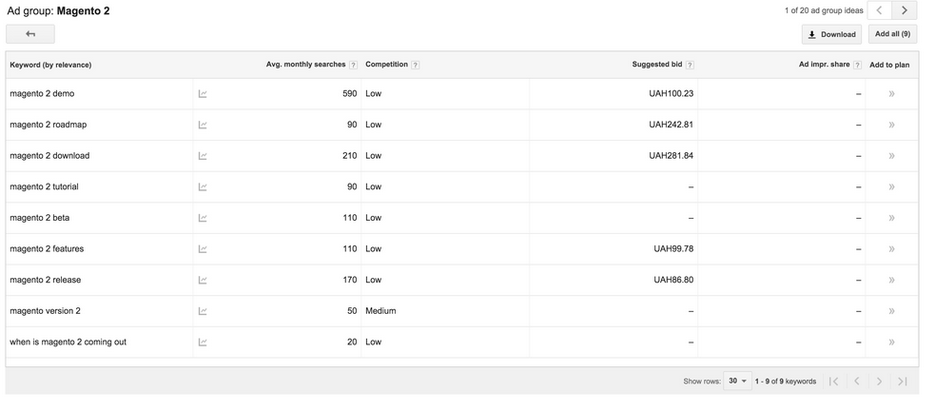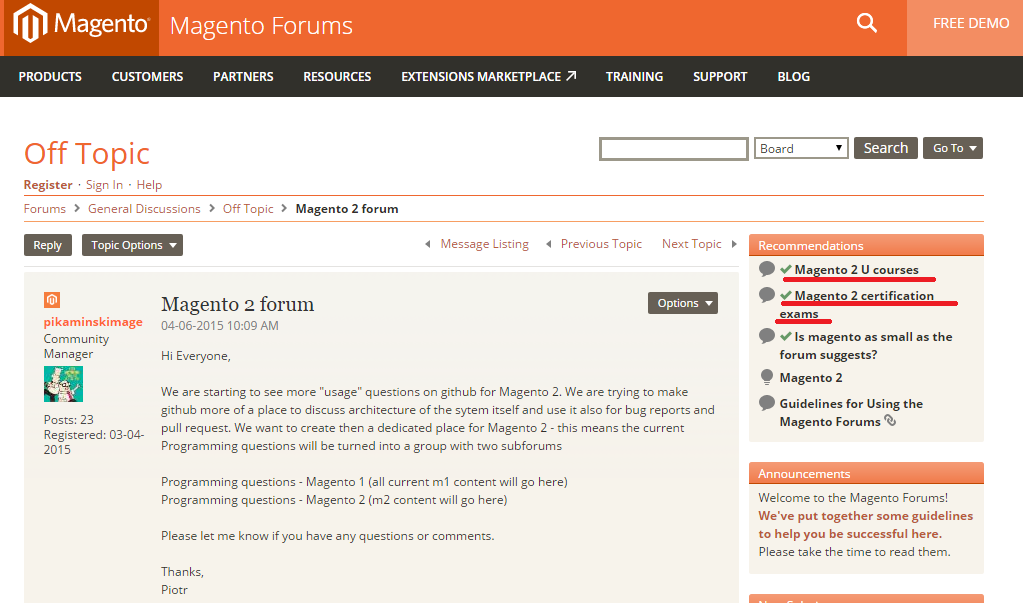DIY SEO: Keyword Research 2016

Most SEO companies and specialists will agree that keyword research is the foundation of SEO, which is impossible without keywords. While figuring out expectations and desires via search queries, your customers create combinations of words, which are extremely important to know and use in your texts if you are going to increase your current Google ranking. Even the best SEO tools will not optimize your website if you don’t utilize keywords, therefore we recommend you to examine the following article, which provides information related to keyword research in 2016.

First of all, you should understand how to find keywords. Note that your top competitors probably know how to master this art, so they have a strong competitive edge over you and your online business. But don’t panic because soon you will also get this precious knowledge.
In order to improve Google search ranking, we recommend you to avoid the following algorithm:
- Figure out few keywords your visitors might search for;
- Go to the Google Keyword Planner (GKP) and plug them there;
- Get a list of keywords.
It is the most obvious keyword research algorithm, but it is very ineffective. Luckily, we know a better solution that will help your site climb to the top of Google. Thus, the most affordable SEO service is always available for free, landing you more leads and sales.
The problem of the aforementioned algorithm is its inaccuracy, so to make your keyword research smarter, you should identify niche markets in your industry. The GKP shows keywords that are directly tied to your query, but you need those keywords that are closely related to your business. At the first blush, this is nonsense, but let’s see the example offered by Brian Dean from Backlinko.
He says that people more often think about NBA, Michael Jordan, and a free throw than about basketball pictures, college basketball, basketball games online, or other keywords from the GKP when they hear the word “basketball.” Now, do you feel the difference?
The trick here is not to forget about the GKP – that would be a serious mistake, but to use this tool in combination with other keyword research techniques. So, how can we identify more precise keywords? With the aid of niche markets of course.
Table of contents
Keyword Research 2016: Niche Markets
Every market consists of small sub-segments called niche markets. For example, you are writing an article about Magento 2; consequently, you are working in a sub-segment of ecommerce market. An essential step in your business is keyword research. As we saw earlier, the GKP will only provide you with very closely related keywords: , Magento 2 roadmap, Magento 2 tutorial, etc.
While some of these keywords might be a great fit for your article, but they are widely used by other people writing about Magento 2. Luckily, there are lots of other keywords that are less popular among your competitors, but can be even more valuable to your work than those offered by the GKP.
To find these untapped keywords, you should figure out niches that are closely related to your business. In our case it is Magento 2; therefore, someone interested in this ecommerce platform may also search for:
- PHP 7, which is a part of a new Magento 2 technology stack;
- ecommerce design, since it is important in every online store;
- server-side performance, as it provides a dramatic influence on the performance of every Magento website;
- how to write stunning descriptions – every ecommerce website has a plethora of goods, so each item requires a good description.
As you can see, these search queries are very different and not even related to each other, especially “PHP 7” and “how to write stunning descriptions,” but they belong to similar niche markets.
In fact, all niche markets linked to your business offer enough keywords, search volume, and commercial intent for optimizing your content and improving Google page ranking. To discover 5 different niche markets, use the following strategies:
Identify your customers. Occupation, gender, age, spending power, hobbies, intentions, and lots of other parameters help to figure out who your customers are. Please note that there are often several groups of potential visitors/buyers in your business niche. Following our Magento 2 example, target audience can be divided into ecommerce merchants, marketers, developers, and tech enthusiasts. Thus, Magento developer will unlikely search for a stunning descriptions guide, but will be interested in PHP 7 and server-side performance, while ecommerce merchant will probably try to dig new information about design trends and better texts.
Perform keyword research on forums. You can find various forums related to your business niche on Google: just type “your keyword” + “forums”. In case of Magento 2 you will get the following search query – “Magento 2” + forums. Alternatively, it is also possible to utilize – a search engine for forums. Once you find a forum, pay attention to its sections, which often represents different niche markets. Various threads represents more precise segmentation. In our case, first to niches are “Magento 2 U courses” and “Magento 2 certification exams.”
Utilize Wikipedia. Curated by thousands of industry experts, this website is another source of information on niche markets. An article about your business contains dozens of hints and advices, you only have to examine its contents and internal links. In case of Magento, niche markets are represented with the following keywords: Imagine eCommerce, Magento certification, MySQL, MariaDB, etc.
Keyword Research 2016: Complexity
Now when you’ve identified your niche markets, it’s time to organize keywords. SEO service providers divide them into three major categories: head, body, and tail keywords; each of which offers unique opportunities. Let’s discuss the features of all three groups.
Head keywords usually consist of a single word, have a large amount of search volume and insane competition. “Ecommerce” is a typical example of a head keyword. Unfortunately, such keywords don’t convert very well, since someone searching for “ecommerce” might be looking for a list of various online retail platforms, related marketing strategies, courses, or just a definition of the word.
As for body keywords, they are 2-3 word phrases with decent search volume, but less intense competition. Body keywords are more specific than the aforementioned ones, for instance “ecommerce platforms” or “ecommerce marketing courses.”
In their turn tail or long tail keywords are 4+ word phrases with very specific meanings. “Ecommerce marketing online courses for merchants” and “order management Magento extensions” are examples of long tail keywords. Since they don’t gain enough search volume individually, it is necessary to use them together with other long tails and body keywords.
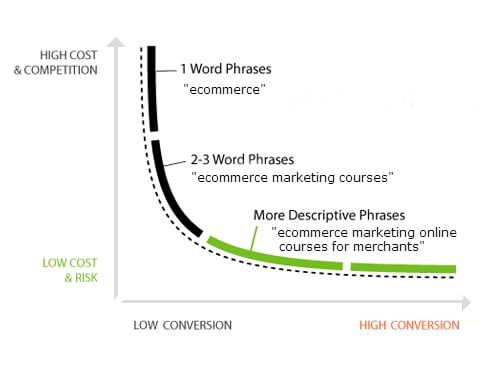
As mentioned above, head terms are extremely competitive and don’t convert well, so they are not very effective. At the same time, longtails are easy to rank for, but each such keyword will only bring 100-1000 searches per month, therefore you need tons of content optimized for long queries. Unfortunately, such strategy puts you at a serious risk of a Google Panda penalty. Thus, body keywords hit the sweet spot of search volume and competition. Furthermore, when you optimize pages around this type of keywords, you usually rank for related long tails as well as head terms automatically.
Keyword Research 2016: Commercial Intent
When it comes to commercial intent, keywords can be divided into four categories: Buy Now Keywords; Product Keywords; Informational Keywords; and Useless Keywords.
Buy Now Keywords
Buy Now Keywords often include the following words: buy, discount, deal, shipping, or coupon. Customers use them before making a purchase. Although “buy guitar strings online” or “Hydra Head vinyls free shipping” may not get great search volume, but both offer high conversion rate.
Product Keywords
Product Keywords are focused on a product category or a brand name, so they often include a specific brand name, product, or category as well as such words as review, best, top, affordable, or cheap. In the buying cycle, these keywords are used a bit earlier than Buy Now Keywords. They still convert well and usually bring more traffic than keywords from the previous category.
Informational Keywords
Informational Keywords don’t tend to convert especially well, but they can bring a lot of visitors to your website if you use words that have high search volume but low competition. Thus, such keywords are ideal for generating new traffic. How to, best way to, I need to are words that can be used in Informational Keywords.
Useless Keywords
There are also keywords that are very unlikely to convert or even bring someone to your website. We call them useless. Such keywords often includes the following words and phrases: Torrent, download, for free.
A keyword like “Futurama Torrent download for free” can bring your website to the first page of Google results, but no one will even visit your website.
Keyword Research 2016: Placement
Below, we describe the most critical locations for your keywords and show how to use them there.
- Page title should be no longer than 55 characters as well as include the most important keyword.
- H1 and H2 header tags should also contain a keyword. Avoid using images there.
- Meta descriptions are limited to 155 characters and require a keyword you’re trying to rank for.
- Alt tags, image file name, description, and caption are other locations for your keywords.
- Content for each page needs to revolve around a single keyword. It’s a good idea to use synonyms instead of using as many keywords as possible.
- Content headline also require a keyword. The same is about URLs.
Keyword Research 2016: Google Keyword Planner
The traditional approach to keyword research relies on Google Keyword Planner, which works only with a Google Adwords account and offers a lot of useful features, but we will discuss only the following three: “Search for new keyword and ad group ideas,” “Get search volume for a list of keyword or group them into ad groups,” and “Multiply keyword lists to get new keyword ideas.”
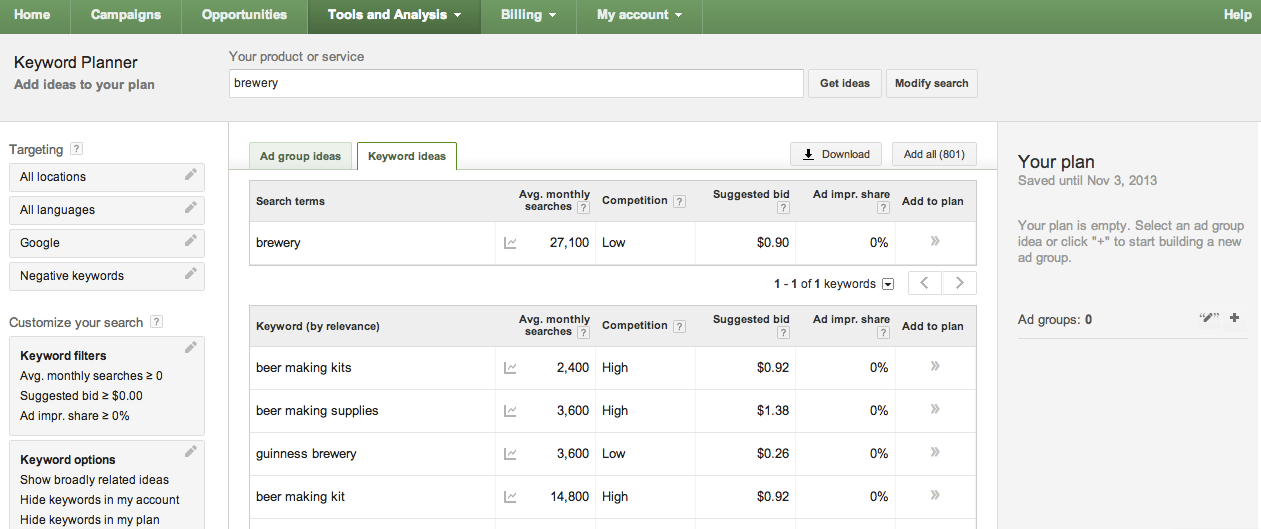
“Search for new keyword and ad group ideas” requires entering information about your products, which can be a head keyword, your website URL, and your product category, which is your niche. The value of keywords you get is based on the information you enter, therefore provide only the most precise data. And don’t forget to select relevant targeting options. For example, your target audience is based in Spain, so you should select this country and change a default language to Spanish. Besides, you can customize your search with keyword filters, options and the include/exclude feature.
“Get search volume for a list of keywords” is a useful feature that helps to check a search volume of already existing keywords. Although, this tool does not generate any new keyword ideas, but it will show how vital are you current ones. Just enter your keywords in the appropriate field or upload a CSV file with them. By clicking “Get search volume” you will find out how many people search for the keywords you chose.
“Multiply keyword lists” mashes groups of keywords into hundreds of combinations and sorts them by relevance. The feature is especially helpful in case of ecommerce keyword research since it shows almost all possible combinations customers use while searching for your goods.
Each feature leads you to the “Keywords Results Page,” so it is necessary to describe major terms:
- Search Terms are the exact keywords you’ve entered.
- Keyword (by relevance) is the list of the most relevant keywords by Google.
- Avg. monthly searches is pretty self-explanatory, but it is necessary to mention that it may depend on a season. There is an icon that illustrates that.
- Competition reflects the number of advertisers bidding on a particular keyword.
- Suggested bid illustrates a keyword’s monetization opportunities.
Keyword Research 2016: Tools
In the following part of the article, you will find a comprehensive list of keyword research tools.
Run a SEO check with IOCheck – the latest SEO software tool. Research keywords, find out keyword grouping, analyse competitors, and run morphological analysis with the newest SEO optimization software.
Paste several keywords relevant in your business niche and get a bunch of new keywords from various sources. Upload a list of keywords and IOCheck will provide you with the analysis of your competitors. Run a competitor’s website SEO check and the map keys necessary to improve your own content.

Seed Keywords generates keyword ideas from other people. You ask your question, get a link, share it with your team or target audience, and get relevant results downloadable via a CSV file. And don’t forget to check the search volumes in Google Planner.

SERPWoo Keyword Finder is another reliable solution for keyword generation. You enter a keyword phrase, then the tool analyzes the first ten domains ranking for your phrase and provides a list of relevant long tail keywords.

Keywordtool.io creates keyword suggestions from Google, Bing, YouTube, and App Store. The tool does not show keyword search volumes, but you can use it for free. Use it in combination with Google Planner.

If you are looking for a robust SEO suit with WordPress integration, pay attention to Spokal. In addition to keyword research capabilities, it offers such features as rank tracking, email marketing workflows, title split testing, etc. It is also necessary to mention that Spokal supports geographical keyword research.
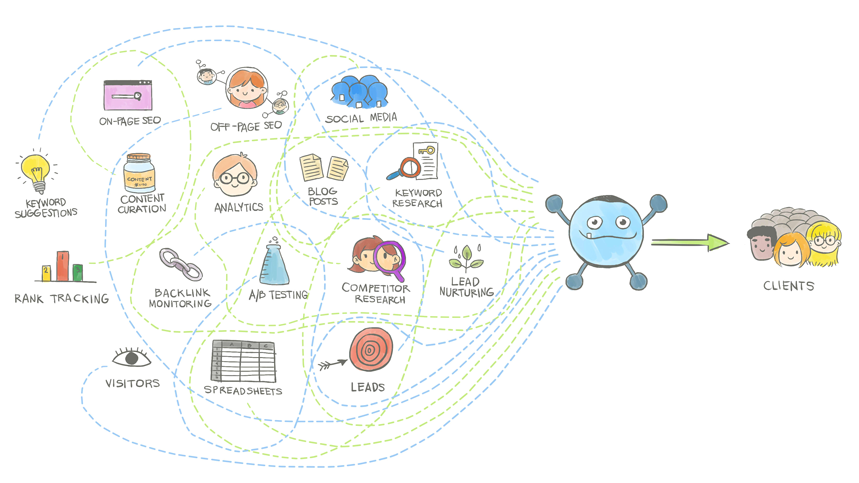
Niche Laboratory is a free tool that analyzes the top 10 search results to produces a list of new keywords, top ranking websites, and niche forums. Beside, you will get a keyword tag cloud.

Enter your keyword, and Wordtracker will generate 10 keyword with the highest search volume. Additionally, it can display competition for these keywords as well as Key Efficiency Index used in the calculation of highest possible keyword potential.
![]()
As for Keyword Discovery, it also creates a list of keyword suggestions based on a term you choose. The free version of the tool adds last year’s search volume, while the paid one provides much wider opportunities.
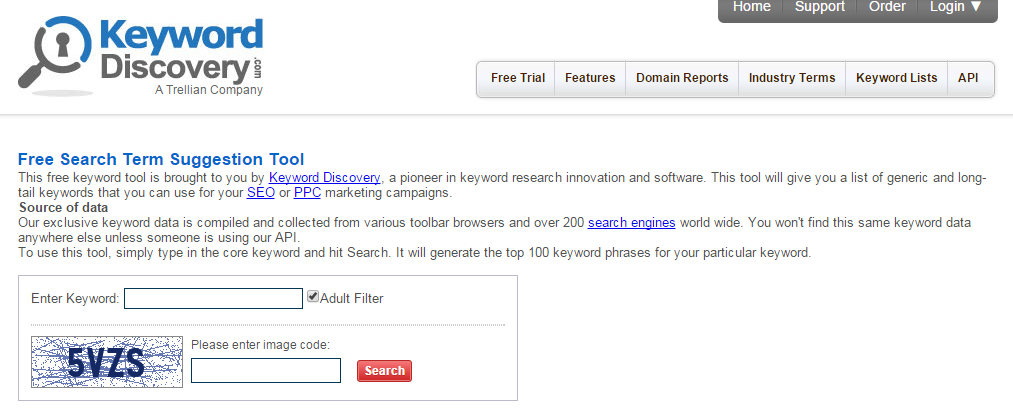
In its turn SEO Book utilizes daily search volumes by Google and Yahoo to make a list of suggested keywords and displays CPC, monthly value, and other SEA metrics .
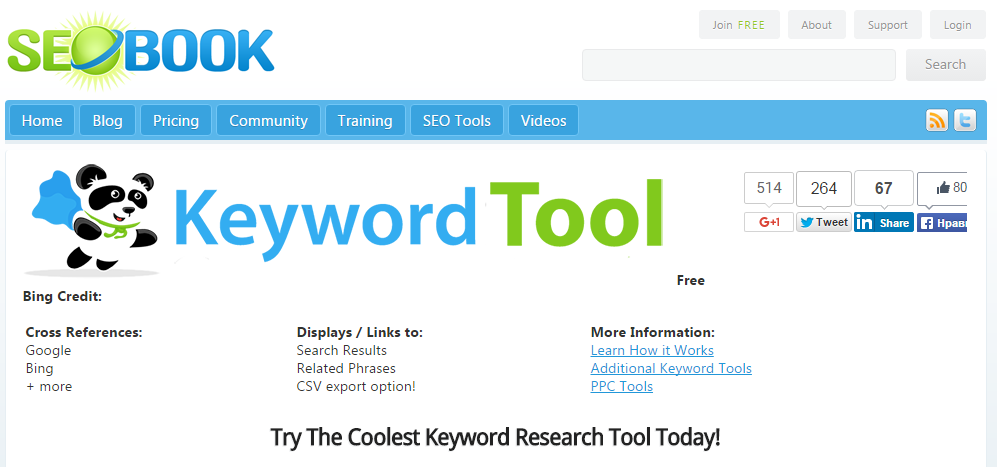
With Wordstream, you only have to type a word into the search bar to get further keyword ideas. All the results are listed according to their relative frequency and can be sent to your email.
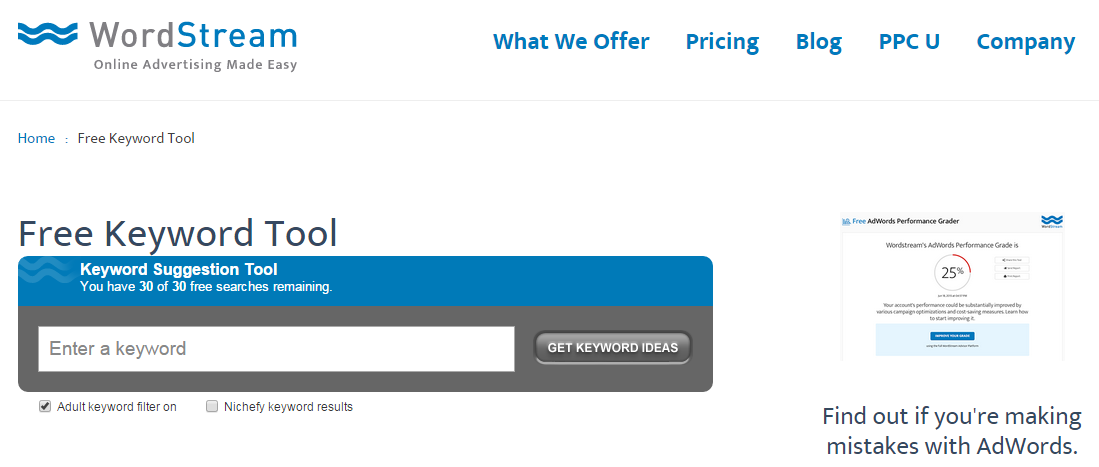
Übersuggest is another reliable keyword research tool. It requires choosing just three parameters: a keyword, a language, and a source. Then, you click “Suggest” and get the result. Furthermore, there are further suggestions available for some keywords.
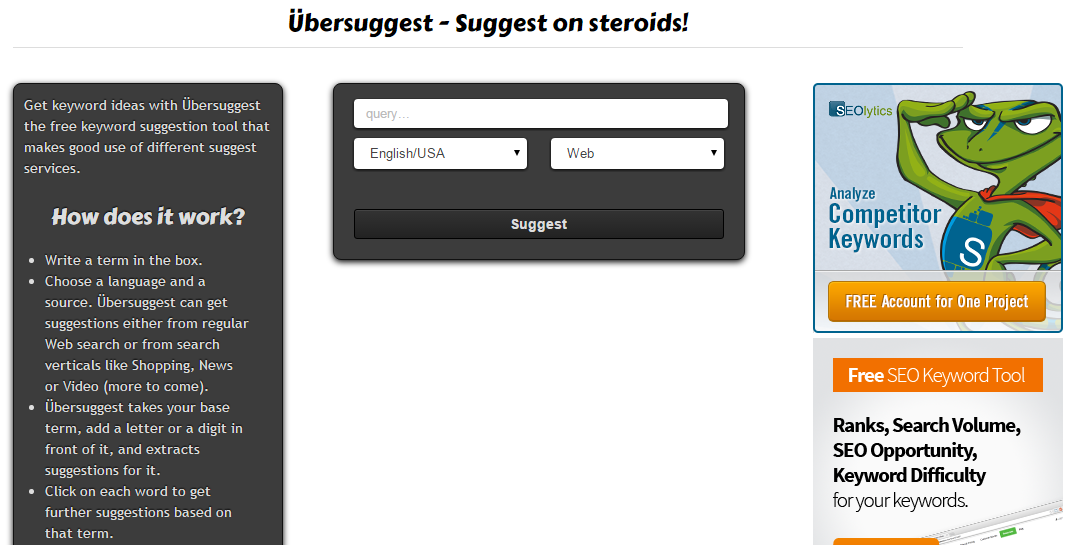
After entering a target phrase and choosing a specific country, you will get potential keyword phrases, keyword trends as well as the top 10 search results from Google. A listing of keywords is based on TextRank and TFIDF.
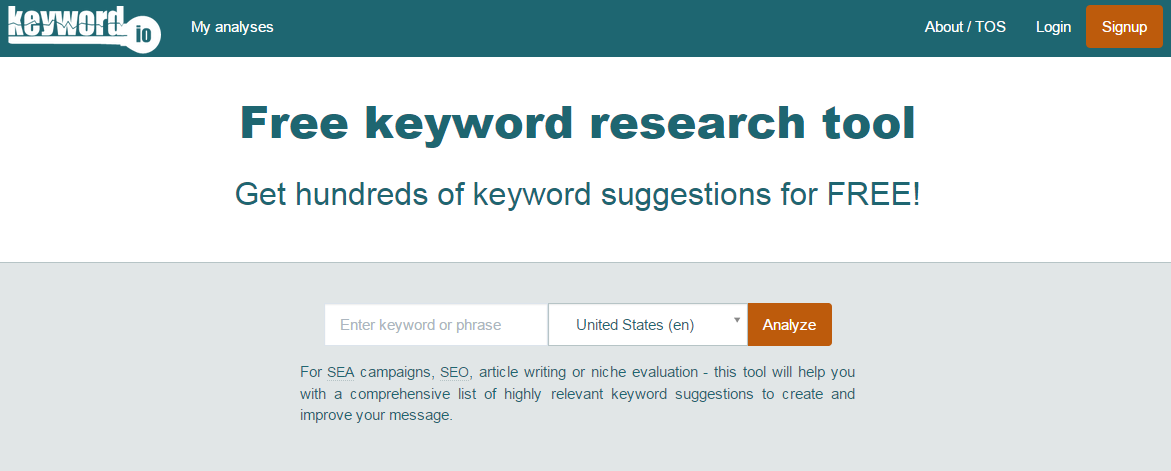
Serpstat relies on two parameters: specific keyword and a chosen domain. There is also a filter that can show keywords that start with a certain term only.

A free Keyword Eye’s plan is limited to 10 searches per day, 100 keyword suggestions per report, and 25 Countries. Paid version includes lots of additional features and remove restrictions.
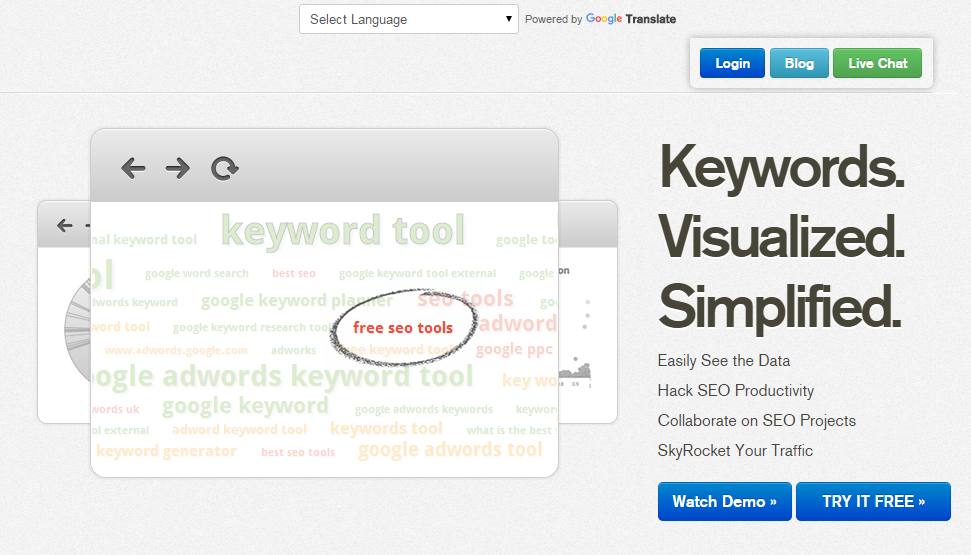
Google is the most affordable keyword research tool due to its Suggest feature. You might have noticed the drop-down menu which opens every time you are typing in the search bar. This menu contains long tail keywords.

____
That was our keyword research guide for 2016. Feel free to ask questions through the comment field below.

